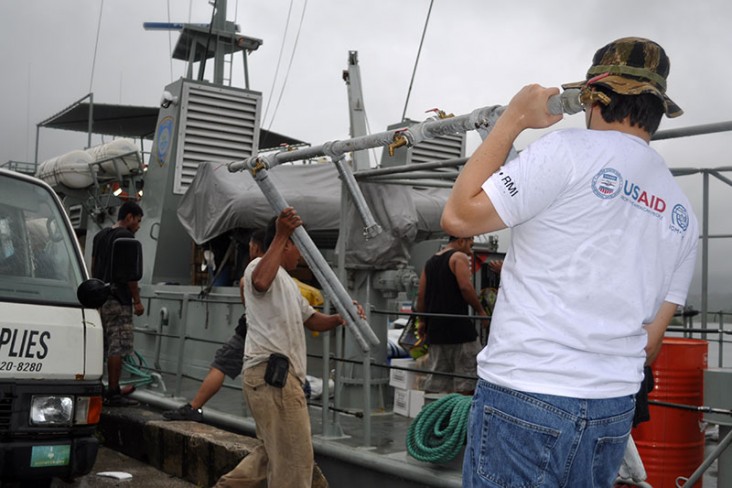
On April 28, 2015, U.S. President Barack Obama issued a Presidential Disaster Declaration after the Federated States of Micronesia (FSM) was severely damaged by Typhoon Maysak, which passed through Chuuk and Yap States between March 29 and April 1, 2015. Under the terms of the Compact agreement between the United States and the Government of FSM, the Declaration mobilized U.S. federal funding for immediate emergency relief and reconstruction assistance.
The U.S. Agency for International Development (USAID) is leading the relief efforts in close coordination with the Department of Homeland Security-Emergency Management Agency (FEMA), the agency responsible for providing funds, and participated in the joint preliminary damage assessment; the Department of Agriculture, Food and Nutrition Services (USDA-F&S) which is providing emergency food aid; and the U.S. Small Business Administration (SBA) responsible for providing private and commercial loans to eligible beneficiaries.
USAID supplements and supports the Government of FSM in all post disaster recovery and reconstruction efforts. USAID is actively engaged with other international donor agencies in coordinating efforts throughout the disaster relief and reconstruction phases.
U.S. Government Emergency Response
- To date, USAID’s Office of U.S. Foreign Disaster Assistance (USAID/OFDA) has airlifted relief items to FSM and provided $2.1 million to the International Organization for Migration (IOM) - USAID’s primary implementing partner in FSM - to support Typhoon Maysak relief and recovery efforts. USAID/OFDA also provided more than $620,000 to the UN Food and Agriculture Organization to restore agricultural production.
- Between April 22 and May 1, IOM delivered USAID/OFDA-provided shelter and water, sanitation, and hygiene (WASH) supplies to benefit more than 200 storm-affected households in Chuuk and Yap states.
- USAID/OFDA has transported 20 reverse osmosis water treatment units from the Republic of the Marshall Islands to FSM, 10 of which were installed as of May 25.
- With support from USAID/OFDA and other donors, IOM established 17 water distribution points and distributed water containers to 3,000 families across Chuuk. IOM also coordinated with the Chuuk Public Utility Corporation to distribute 2,000 gallons of water per day to storm-affected communities throughout the Chuuk Lagoon islands. Additionally, IOM provided more than 530 families in the Chuuk Lagoon islands with hygiene kits.
- In Yap State, USAID/OFDA had delivered more than 44,000 pounds of locally-procured food to storm-affected communities in Ulithi Atoll as of May 1.
USAID/OFDA is also supporting efforts to maintain environmental hygiene by providing waste-collection equipment to storm-affected populations.
Repair and Reconstruction of Public Infrastructure
USAID will work closely with FSM authorities in Chuuk and Yap to repair public infrastructure damaged by the typhoon. USAID will coordinate with local authorities to assess damage to public infrastructure, including utilities. USAID will coordinate with local partners to repair or reconstruct public schools, health facilities and community centers. Assistance will also be made available for the rehabilitation of public utilities (e.g. power and telecommunications), government administration buildings, sea walls and jetties.
Housing Assistance
Shortly after the disaster, USAID identified homeowners eligible for housing assistance and entered their information into the Typhoon Maysak Disaster Reconstruction Database, which is maintained by IOM. To be eligible for housing related assistance, the verifiable typhoon-related damages to a homeowner’s primary dwelling must exceed $500. The beneficiaries must also be able to demonstrate home and land ownership.
Eligible households are entitled to a specific package of appropriate assistance that includes:
- "Startup" Assistance for purchase of household items. This assistance typically consists of cooking utensils, household and personal items such as bedding, jerry cans and soap, and construction tools. The start-up grant will vary, depending the severity of the damage to the home.
- Housing Replacement Assistance for destroyed homes, entitling the eligible homeowner to full replacement of their primary sleeping quarters. A home is categorized as “destroyed” if there is evidence that Typhoon Maysak caused complete destruction of the roof and at least one of its walls. Housing Replacement Assistance will include the construction of a standard size of sleeping quarters. This replacement home will be built by professional experts at the same location as the destroyed home. Households eligible for housing replacement will receive a $750 startup assistance grant.
- Major Repair Assistance for severely damaged homes. This assistance will be provided if a home is not habitable without significant repairs, or if substantial failure of structural components such as walls, roofs, floors, and foundations has occurred. The assistance includes a package of building materials and tools equivalent to $3,000, and a startup grant of $400.
- Minor Repair Assistance for homes whose structural integrity has not been compromised or which can be made habitable in a short period of time. The assistance includes materials and tools for repairs inclusive of all management, logistics and transportation costs. The assistance includes a package of building materials and tools equivalent to $1,500 and a startup grant of $200.
Implementing Partner:
International Organization for Migration







Comment
Make a general inquiry or suggest an improvement.